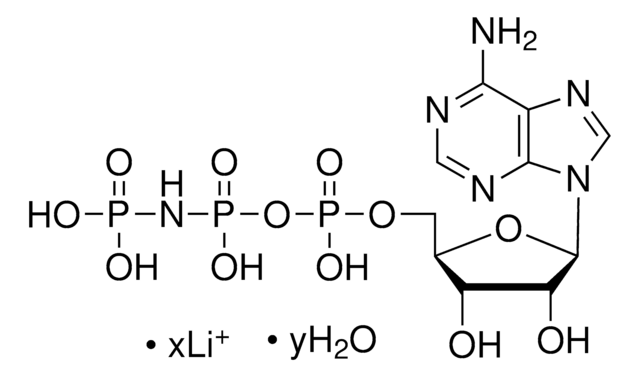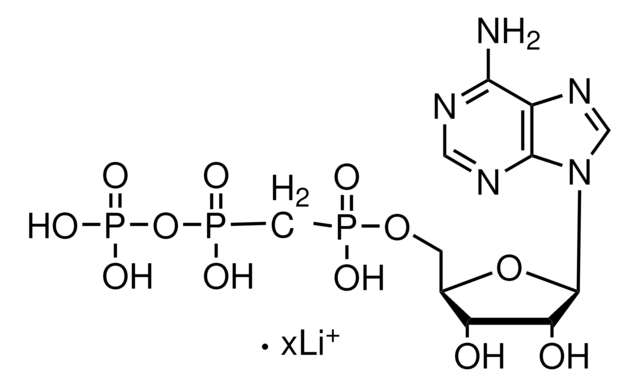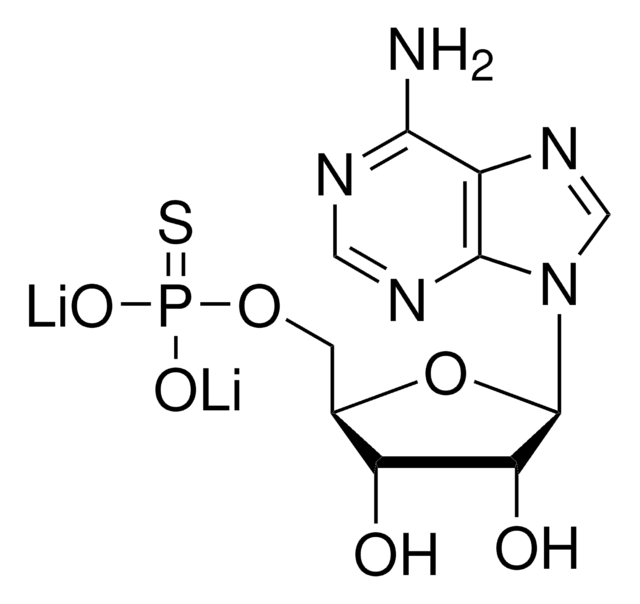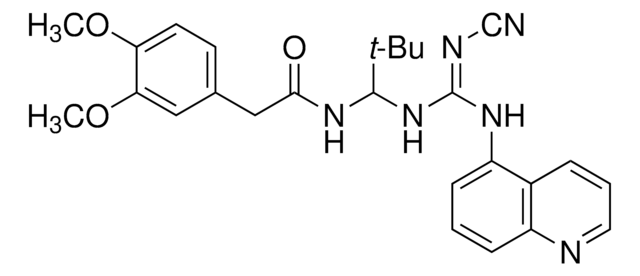11162306001
Roche
ATP-γ-S
=90% (HPLC), solution, pkg of 200 μL (20 μmol)
Synonym(s):
adenosine-5′-o-(3-thio-triphosphate)
Sign Into View Organizational & Contract Pricing
All Photos(1)
About This Item
UNSPSC Code:
12352204
Recommended Products
Quality Level
description
C10H16N5O12P3SLi (Formula)
Lithium salt
Assay
90% (HPLC)
form
solution
mol wt
523.2
packaging
pkg of 200 μL (20 μmol)
manufacturer/tradename
Roche
λmax
260 nm at 100 mmol/L
shipped in
dry ice
storage temp.
−20°C
Related Categories
General description
Adenosine 5′-O-(3-thiotriphosphate), lithium salt, solution.
Application
ATP-γ-S has been used:
- to treat THP-1 macrophage cell lines for testing if endoplasmic reticulum (ER) stress causes the production of interleukin (IL)-1β
- in amide hydrogen exchange (HX) experiments coupled to mass spectrometry and study the cyclomarin A (CymA)-induced structural changes in NMtb-ClpC
- as a supplement in CMG-binding buffer for gel-based DNA unwinding assays
Biochem/physiol Actions
Adenosine 5′-O-(3-thiotriphosphate) (ATP-γ-S) is a substrate and inhibitor of ATP-dependent enzyme systems. It is hydrolyzed very slowly by phosphatases and most ATPases. Once thiophosphorylated, proteins are resistant to protein phosphatases. ATP-γ-S serves as a damage-associated molecular pattern molecule (DAMP) and NLR family pyrin domain containing 3 (NLRP3) inflammasome activator. ATP-γ-S may serve as a substrate for RNA-stimulated nucleotide hydrolysis and RNA unwinding activities of eukaryotic initiation factor-4A (eIF4A).
Quality
Contaminants: ≤10% ADP (HPLC)
Other Notes
For life science research only. Not for use in diagnostic procedures.
Storage Class Code
12 - Non Combustible Liquids
WGK
WGK 1
Flash Point(F)
No data available
Flash Point(C)
No data available
Choose from one of the most recent versions:
Already Own This Product?
Find documentation for the products that you have recently purchased in the Document Library.
Customers Also Viewed
Alana G Lerner et al.
Cell metabolism, 16(2), 250-264 (2012-08-14)
When unfolded proteins accumulate to irremediably high levels within the endoplasmic reticulum (ER), intracellular signaling pathways called the unfolded protein response (UPR) become hyperactivated to cause programmed cell death. We discovered that thioredoxin-interacting protein (TXNIP) is a critical node in this "terminal UPR."
Michael Maurer et al.
Cell chemical biology, 26(8), 1169-1179 (2019-06-18)
ATP-driven bacterial AAA+ proteases have been recognized as drug targets. They possess an AAA+ protein (e.g., ClpC), which threads substrate proteins into an associated peptidase (e.g., ClpP). ATPase activity and substrate selection of AAA+ proteins are regulated by adapter proteins
Antonia Recabal et al.
Journal of neurochemistry, 156(2), 182-199 (2020-09-17)
In the adult hypothalamus, the neuronal precursor role is attributed to the radial glia-like cells that line the third-ventricle (3V) wall called tanycytes. Under nutritional cues, including hypercaloric diets, tanycytes proliferate and differentiate into mature neurons that moderate body weight
Our team of scientists has experience in all areas of research including Life Science, Material Science, Chemical Synthesis, Chromatography, Analytical and many others.
Contact Technical Service![Adenosine 5′-[γ-thio]triphosphate tetralithium salt ≥75% (HPLC), powder](/deepweb/assets/sigmaaldrich/product/structures/319/398/e29221c2-3649-455b-bd33-583bb017ec7d/640/e29221c2-3649-455b-bd33-583bb017ec7d.png)




![γ-[(Propargyl)-imido]-ATP sodium salt](/deepweb/assets/sigmaaldrich/product/structures/394/730/00e7a2cd-6683-4939-9d87-4c35480b1186/640/00e7a2cd-6683-4939-9d87-4c35480b1186.png)


![γ-[(6-Azidohexyl)-imido]-ATP sodium salt](/deepweb/assets/sigmaaldrich/product/structures/219/775/fab7c78e-9638-4061-9426-e4c60dc1fb76/640/fab7c78e-9638-4061-9426-e4c60dc1fb76.png)


